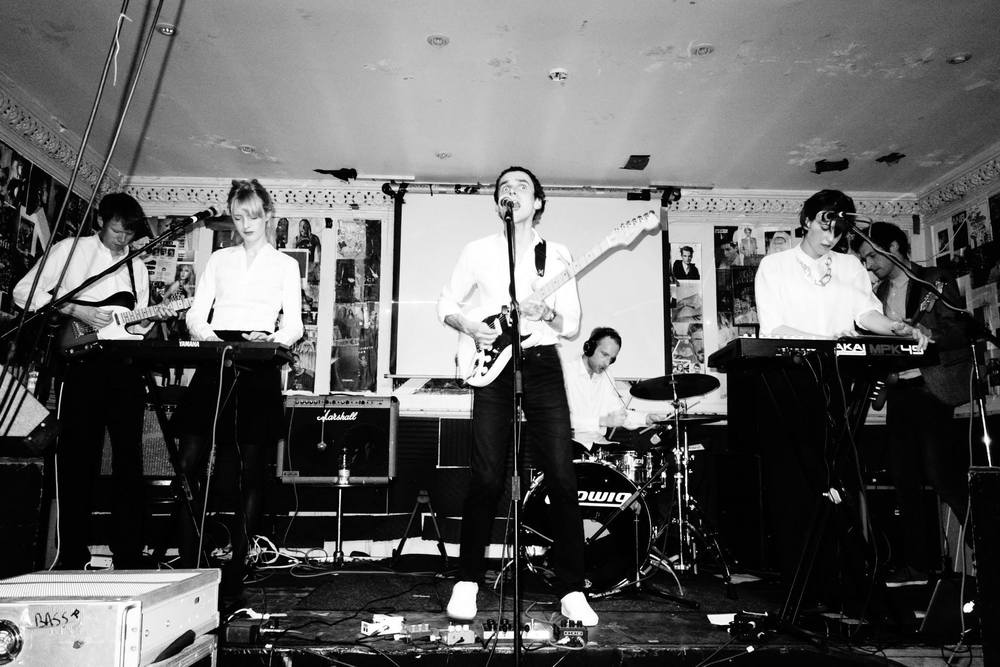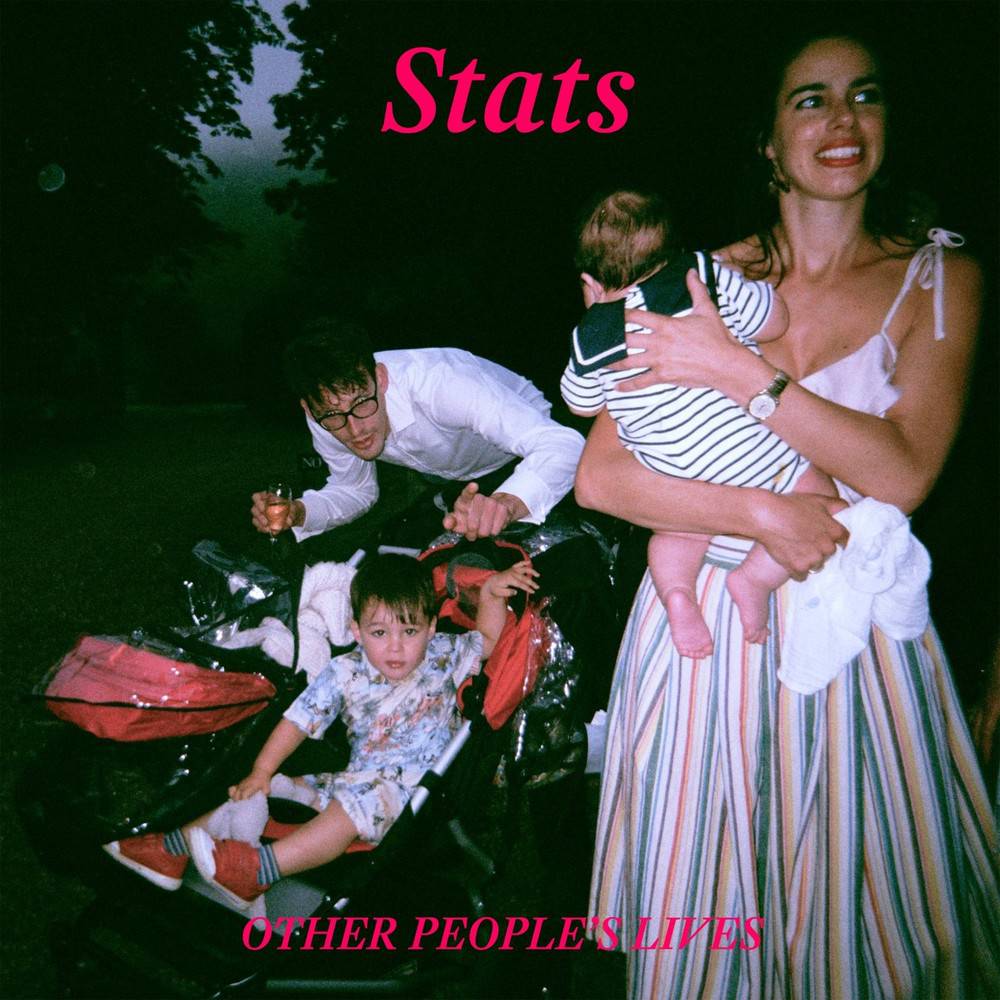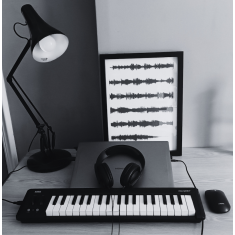Stats
Ed Seed

photo by Paul Cook
“Other People’s Lives“ is a really good album by the Stats, a band from London. But as I was listening to the last epic track of their album “Never Loved Anyone” while at the same time reading Ed Seed’s response to a question concerning his views on Brexit, I realized that sometimes we can make things difficult when in truth they are not. “It is an act of national suicide”, says Ed and I totally agree with him. The consequences of the country leaving the EU are well known to most people, if not to everyone. But the British artist goes on to analyze by saying: “it is more about an effort to blame the black cloud called “Europe” rather than everything that is wrong in our country. In reality, though, most things we have either done wrong ourselves or are deeply rooted in the idea of globalization and the political measures that have been implied some 30 or more years ago, long before the guidance of the European Union”. I am actually very pleased that an artist speaks his mind and bluntly reveals the truth. He talks of the deceit and lies coming from the media that slowly led a country to the exit door, as an act of self-punishment for the sake of xenophobia and adventurism.
The Stats, besides being conscious artists, posses a refined sense of humour and a mental state that actually multiplies the dynamic of their debut album. The song “I Am An Animal” for example includes lyrics such as ”I will forget how to do my photo smile, it’s as clean and flawless as a bathroom tile”, that are being transmitted simply and naturally. The whole album is filled with funky dance beats and electronic rock textures. Multiple layers of synthesizers, electric guitars and a rock rhythmic feel from drummer John Barrett (of Eugene McGuinness) and bass player Stu Barter; who gets credit for the exquisite bass in “Rhythm of the Heart” as well as the whole album.
Seed’s answer on how the album was recorded came as a surprise: it was done with all the instruments playing simultaneously, as would happen in a live show. The method was also simple and started with the choice of a certain beat, upon which all the ideas and melodies the six musicians had in mind were incorporated, resulting in the coordinated and unscheduled gathering of all their energy and inspiration. The album’s sound surely reminds us of styles from the 80’s and 90’s, like in the tracks “Family Business” and “Raft”. Although Ed himself might not have intended or consciously realized, “Other People’s Lives” sounds a lot like music from those decades.
Not to mention, they reminded me of sounds from even older times, like John Lennon of the 70’s in the song “A Man Who Makes The Weather" with its iconic piano, or contemporary Franz Ferdinand, with whom they share similarities. Nevertheless, and judging from the outcome, the record does not fall away from its initial dance design and is more than full in catchy, memorable tunes. Τhe Stats are indeed a great discovery for the year 2019, even if you read their name backwards...
Other People's Lives (out 15/2/2019)
The Basement: Hello Stats, hello Ed, Thank you for joining us. Debut LP "Other People’s Lives” was released on February 15th, what will we discover in your LP?
You will have fun! I hope you might dance a little, and hopefully, the words will bring you some feelings.
The Basement: How did you meet the rest of the musicians in your band? Who are they?
They are John Barrett on the drums, Stu Barter on the bass and singing, Duncan Brown on the guitar, Nicole Robson on keyboards and singing and Iso Waller-Bridge on keyboards and singing. John I met when we both played for our friend Eugene McGuinness; Duncan and I were in a country-punk band together, we met Stu and Nicole through being in the same sort of music scene, and I met Iso at a party through a mutual friend. They are all fabulously talented, and have their own projects outside Stats.
The Basement: What is the meaning of your band name?
The word “STATS” is good because it’s the same backwards and forwards and any way round - it is infinite. Initially we were called Stats because there are now numbers and statistics and measurements in parts of life where there were no numbers before: dating is stats, friendship is stats, jobs are stats, your work is measured in stats, and so on. Stats are everywhere, and you can often feel like you are simply a stat. At the same time, though, statistics offer a sort of false comfort, they claim to be objective and true and certain, and they never really are - they are conditional on who is measuring what, how and when. That doomed attempt to impose order and structure on a chaotic world, that is something that comes up quite a bit in the things I write about.
The Basement: We can spot sound similarities with eras such as the 80s and 90s. "Raft" and "The Family Business" are obvious examples for that. Were you up to touch those years? What are your influences?
I’m too young to remember the 80s, and I didn’t really like the music of the 90s as I remember it - though I was probably listening to all the wrong things! I’m influenced by all kinds of things, often as much by books or films or places as by music. I like things that are mostly rhythmic but also have a story, especially if that story is incomplete or partly obscure, so you’re invited to make your own connections between the things that are said. It’s kind of hard to define, but some examples of that might be ‘O Superman’ by Laurie Anderson, ‘There’s A Riot Goin On’ by Sly & The Family Stone, ‘Remain In Light’ by Talking Heads, ‘The Black Saint And The Sinner Lady’ by Charles Mingus, ‘The Hissing Of Summer Lawns’ by Joni Mitchell, the movies ‘2001’, ’Koyyanisqatsi’ and Patrick Keiller’s ‘London’, the Piazza of the Tsukuba Cultural Centre by Arata Isozaki, or the novel ‘My Year Of Rest And Relaxation’ by Otessa Moshfegh.
The Basement: Who wrote the songs? Tell us more about the way you made them.
I write the words, but the music is mainly cut and pasted together from short sections of long jams we did in a two-day session at RAK Studios in London. We picked a tempo, sometimes a vague starting idea and the six of us would just start playing off the top of our heads, for anything between 10 minutes and half an hour. When people play a song that has a definite structure - verse/chorus/verse/chorus/middle 8/chorus - they play it very self-consciously, because they are always thinking about what they’re doing, since there are structural rules they have to obey. They end up playing in a very cautious and rigid way, as if they were approaching a door. Our jamming approach was designed to get rid of that inhibition - we would just play and play, forgetting ourselves, forgetting what we were doing. Someone has an idea and someone else will follow, and you’ll glide in and out of each other’s paths, and at some point - even if just for second - you will all synchronize in some new and exciting way. In the weeks and months that followed the session, I listened to all the tapes and found these moments of inspiration, then cut them out and structured them loosely into “songs”. I write words completely separately from music, so after I had these rough backing tracks, I set up a mic at home, thought about how the music made me feel, and started singing tons and tons of different ideas until something felt right. In some ways it’s a very quick process, in other ways it’s very long!
The Basement: Is "Other People's Lives" talking about your life story or people's stories in general?
Both. This album is about realizing that my life story is full of holes. The world encourages me to experience my life as a narrative; a story in which I am the lead character, going on a journey, moving towards the discovery and realization of an authentic self. Other people's lives are presented to me as coherent, relatable stories, full of passion, travel, and wonder. But my story makes no sense; it is full of contradictions and formless subplots, and I barely feel like the same actor from one day to the next, let alone find any meaning in it. I find meaning when I lose myself, in the moments it dissolves into unity with those other people: lying in bed with the person I love, dancing, caring for a baby, standing in a stadium crowd, drinking, reading, and playing music in this band. Dance music is unity music, music you can rely on and lose yourself in, for all those situations.
The Basement: If you had one single chance to change something on the album, what would that be?
Nothing. It isn’t perfect, but it’s everything I wanted it to be and way more, and I’m very proud of it and everyone who made it.

The Basement: Does this family cover wants to tell us something? Who took it and why you chose it?
The photo is by our friend Bob Foster, who takes all pictures of us, and whose work is on all the single covers that go with this album - we also made a very limited edition photo book to go with the first few vinyl copies of the record, I think they’re all gone now. I don’t have one but wish I did! Bob gave me his entire archive when I was looking for a cover for the album, and this one leapt out straight away. To me it is beautiful, absurd, intriguing, funny, touching, weird… It invites many questions, like other people’s lives always do. It is very domestic, which the album is - much of it is about home life, coming from my partner and I having a baby, and me coming home from full-time pop touring to look after him. That is a very full-on and almost psychedelic experience - it’s that world of the cosmic-domestic that the songs inhabit, and the cover also expresses that.
The Basement: You call yourselves a dance band but you're "..trying to avoid being trapped to a time and place", as you mention on the release info. So, you don't intend to be heard on dance floors only?
I would equally love the songs to be heard on dance floors, car radios, airport lounges, out of high-end headphones or iPhones on buses, massive stadiums, at the top of a mountain, in a cruise ship restaurant, on the office stereo, blasted into space from a telescope… I just love that people listen to them anywhere!
The Basement: You really "Never Loved Anyone"? This is a mesmerizing and deep song, don't you think?
I’m glad you think so! In lots of ways it’s my favorite, it makes me very happy that lots of people have got in touch to say they like that one. To me, the song is about realising that I had never fully understood what the word “love” meant until I truly did fall in love - the selflessness of it, the melting into each other, sharing every single part of yourselves and your lives with no reservations or fear. It made me realise that I had never had that before with anyone, even though I had said the words to other people in the past, and this was bittersweet.
The Basement: What about Brexit? Are there any thoughts of yours? On our conversations with British artists, they seem to be disrupted and pissed off.
It’s a disaster. It’s specifically dangerous for the touring music industry, not just for artists, but for the parts of the industry that Britain does as well as anyone in the world - bus companies, PA and lighting companies, the infrastructure that makes tours of all sizes happen. More broadly than that, it’s an act of national suicide, we are declaring ourselves irrelevant and giving in to all the worst aspects of the national character - xenophobia, arrogance and pigheadedness. This was a marginal vote, on an issue too complex to put to a simple binary choice, a vote that was won with lies and corrupt means. In Greece you know better than anyone that the EU can be a blunt and punishing force, and it clearly needs major reforms in lots of areas. But in the UK this isn’t really about the EU, because general understanding of what the EU does and even how it is structured is so poor - it’s not even well understood that the UK already had highly preferential status in the EU, having been granted all kinds of vetos and opt-outs over the years. It’s more about blaming this cloud called “Europe” for all the many things that are wrong with our country, but most of which we have either done to ourselves (public services ruined by years of austerity, for instance) or have much deeper roots in globalization or policies that were made 30+ years ago with no direction from the EU (the death of British manufacturing, say).
The Basement: Propose us some similar contemporary artists to your aesthetics, that we should have a listen to.
I don’t know how similar our aesthetics are to these, but I am currently loving ‘Compliments Please’ by Self Esteem, ‘Physical’ by Gabe Gurnsey, ‘Pastoral’ by Gazelle Twin, ‘Affection’ by Private Agenda, ‘New Brighton’ by Nakhane, ‘Trust In The Lifeforce Of The Deep Mystery’ by The Comet Is Coming, ‘Suburban Gothic’ by Eugene McGuinness, ‘Make It Happen’ by Park Hotel and ‘Eyes Of The Moon’ by Seahawks.
The Basement: Are you playing any gigs soon?
Yes!
Bermondsey Social Club, London - April 17th
Are You Listening Festival, Reading - April 27th
Hyde Park Book Club, Leeds - May 7th
Hug and Pint, Glasgow - May 8th
YES, Manchester - May 9th
The Basement: Would you like to say something to your Greek audience?
I hope we can come visit you very soon! Please do get in touch and say hi, tell us where we should go in Greece, and send us good new Greek music that we should be hearing.xx
Special thanks to Kiki Silkoglou for the extra help.











